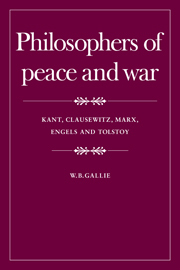5 - Tolstoy: from War and Peace to The Kingdom of God is within You
Published online by Cambridge University Press: 24 October 2009
Summary
Tolstoy's concern with war falls, at first sight, into two sharply contrasting stages. In his wayward youth and immensely creative early middle age, his literary response to war, as to all other great excitements and trials of life, showed a remarkable width and depth of feeling, perception and judgment. To this stage belong his masterly journalistic sketches of the fighting at Sebastopol, his early tales of army life, and the epic accounts of battles and campaigns in War and Peace – to the last of which he appended his often less happy diatribes against the ‘great men’ theory of history. There followed the period of Tolstoy's spiritual and nervous crisis, from which, he believed, he had been saved only by his conversion to his own idiosyncratic version of Christianity, centred on the command ‘Resist not him that is evil.’ This, it is natural to infer, explains his later concern with war which was certainly not the result of any new experience of it nor of further study and reflection on its role in history, but rather of some private psychological necessity. And what else could this necessity be but his continuous struggle, during his last thirty years, to live by – and to present himself as at peace with – his new Christian vision, which implied the total rejection of war? This, it is widely believed, was the inspiration of such fiercely polemical essays as Christianity and Pacifism and The Kingdom of God is within you.
Both stages of Tolstoy's thought about war have been subjected to careful study by biographers and literary critics, as well as by historians of ideas and spokesmen of different pacifist movements.
- Type
- Chapter
- Information
- Philosophers of Peace and WarKant, Clausewitz, Marx, Engles and Tolstoy, pp. 100 - 132Publisher: Cambridge University PressPrint publication year: 1978



